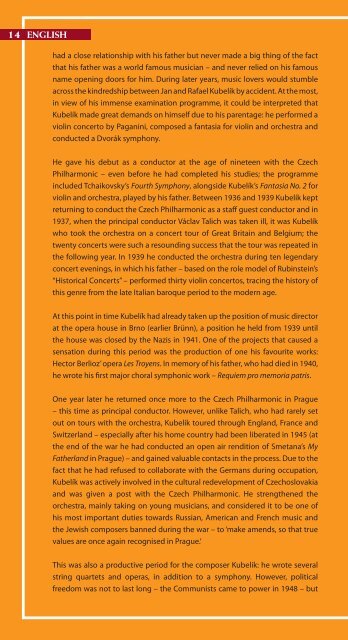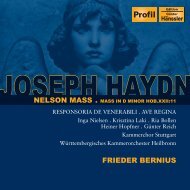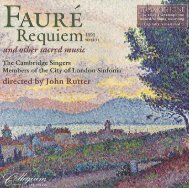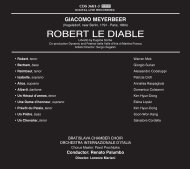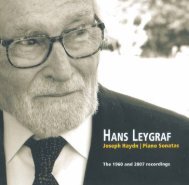RAFAEL KUBELÍK
RAFAEL KUBELÍK
RAFAEL KUBELÍK
Erfolgreiche ePaper selbst erstellen
Machen Sie aus Ihren PDF Publikationen ein blätterbares Flipbook mit unserer einzigartigen Google optimierten e-Paper Software.
14 ENGLISH<br />
had a close relationship with his father but never made a big thing of the fact<br />
that his father was a world famous musician – and never relied on his famous<br />
name opening doors for him. During later years, music lovers would stumble<br />
across the kindredship between Jan and Rafael Kubelík by accident. At the most,<br />
in view of his immense examination programme, it could be interpreted that<br />
Kubelík made great demands on himself due to his parentage: he performed a<br />
violin concerto by Paganini, composed a fantasia for violin and orchestra and<br />
conducted a Dvorák symphony.<br />
He gave his debut as a conductor at the age of nineteen with the Czech<br />
Philharmonic – even before he had completed his studies; the programme<br />
included Tchaikovsky’s Fourth Symphony, alongside Kubelík’s Fantasia No. 2 for<br />
violin and orchestra, played by his father. Between 1936 and 1939 Kubelík kept<br />
returning to conduct the Czech Philharmonic as a staff guest conductor and in<br />
1937, when the principal conductor Václav Talich was taken ill, it was Kubelík<br />
who took the orchestra on a concert tour of Great Britain and Belgium; the<br />
twenty concerts were such a resounding success that the tour was repeated in<br />
the following year. In 1939 he conducted the orchestra during ten legendary<br />
concert evenings, in which his father – based on the role model of Rubinstein’s<br />
“Historical Concerts” – performed thirty violin concertos, tracing the history of<br />
this genre from the late Italian baroque period to the modern age.<br />
At this point in time Kubelík had already taken up the position of music director<br />
at the opera house in Brno (earlier Brünn), a position he held from 1939 until<br />
the house was closed by the Nazis in 1941. One of the projects that caused a<br />
sensation during this period was the production of one his favourite works:<br />
Hector Berlioz’ opera Les Troyens. In memory of his father, who had died in 1940,<br />
he wrote his first major choral symphonic work – Requiem pro memoria patris.<br />
One year later he returned once more to the Czech Philharmonic in Prague<br />
– this time as principal conductor. However, unlike Talich, who had rarely set<br />
out on tours with the orchestra, Kubelík toured through England, France and<br />
Switzerland – especially after his home country had been liberated in 1945 (at<br />
the end of the war he had conducted an open air rendition of Smetana’s My<br />
Fatherland in Prague) – and gained valuable contacts in the process. Due to the<br />
fact that he had refused to collaborate with the Germans during occupation,<br />
Kubelík was actively involved in the cultural redevelopment of Czechoslovakia<br />
and was given a post with the Czech Philharmonic. He strengthened the<br />
orchestra, mainly taking on young musicians, and considered it to be one of<br />
his most important duties towards Russian, American and French music and<br />
the Jewish composers banned during the war – to ‘make amends, so that true<br />
values are once again recognised in Prague.‘<br />
This was also a productive period for the composer Kubelík: he wrote several<br />
string quartets and operas, in addition to a symphony. However, political<br />
freedom was not to last long – the Communists came to power in 1948 – but


